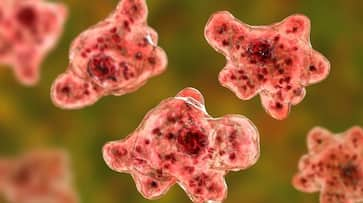The amoeba is found in contaminated water and can enter the human body through the nose and cause a fatal infection.
Kerala is currently dealing with an outbreak of a rare brain infection called amoebic meningoencephalitis, caused by an amoeba. The threat is getting serious in Kerala as the infection has claimed three lives, including that of a 14-year-old boy who died from the infection in Kozhikode, Kerala. The teenager died in the hospital during the treatment. As per the Kerala Health Department, the boy named Mridul died on July 3 around 11:20 p.m. The infection is due to the live amoeba in the contaminated water consumed by humans. As per the department, the infection has a mortality rate of 95–100%.
Also Read: Breast Cancer Diagnosis and Early Detection: What are the procedures involved
This is the third life claimed by the infection in the South since May. The first death from amoebic meningoencephalitis occurred in Mallapuram on May 21, where a 5-year-old girl died from the infection, and the second death was of a 13-year-old girl in Kannur on June 25.
As per the Kerala Health Department, the infected child had a bath in a small pond where the water was contaminated by the amoeba. The department is taking precautions now, and actions have been taken to spread awareness and educate people about the cause and prevention of the disease. The amoeba is found in contaminated water and can enter the human body through the nose and cause a fatal infection.
What is Naegleria fowleri?Naegleria fowleri is a microscopic pathogen found in warm freshwater such as ponds, lakes, hot springs, and rivers. It is also found in soil and untreated water. Humans can get infected by Naegleria fowleri amoeba by swimming or diving in contaminated water. The amoeba enters the body through the nasal cavity and often causes a fatal infection called primary amebic meningoencephalitis (PAM). As per Cleveland Clinic, the disease spreads quickly and requires immediate treatment.
Also Read: Why do UTI cases spike up during the monsoon? Here's everything you need to know
Symptoms of primary amebic meningoencephalitis (PAM)Primary amebic meningoencephalitis (PAM) generally shows symptoms from 5-9 days. The early symptoms include headache, vomiting, fever, and nausea. Later the symptoms can worsen to a stiff neck, hallucinations, lack of attention, seizures, confusion, and loss of balance.
Tips to prevent PAM while swimmingThe Centres for Disease Control and Prevention (CDC) has released the following precautions:
- Stay away from warm waters or when the water level is low. These conditions are ideal for Naegleria fowleri.
- Make sure you use a nose clip or shut your nose using your hands while diving in warm freshwater bodies.
- Keep your head above the water and avoid getting it into your mouth or nose.
- Do not disturb the sediments in shallow water as it may release the amoeba into the river, pond, or lake.
- Boil tap water for 1 minute and let it cool. Use it to rinse your sinuses with neti pots, squeeze bottles, bulb syringes, or other nasal cleansing devices.
Last Updated Jul 5, 2024, 2:48 PM IST









![Salman Khan sets stage on fire for Anant Ambani, Radhika Merchant pre-wedding festivities [WATCH] ATG](https://static-gi.asianetnews.com/images/01hr1hh8y86gvb4kbqgnyhc0w0/whatsapp-image-2024-03-03-at-12-24-37-pm_100x60xt.jpg)
![Pregnant Deepika Padukone dances with Ranveer Singh at Anant Ambani, Radhika Merchant pre-wedding bash [WATCH] ATG](https://static-gi.asianetnews.com/images/01hr1ffyd3nzqzgm6ba0k87vr8/whatsapp-image-2024-03-03-at-11-45-35-am_100x60xt.jpg)


